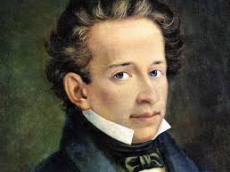
Email: ZYVC057@live.rhul.ac.uk
Total Article : 213
About Me:I'm a graduate student studying International Criminal Law and first started writing for King's News almost 4 years ago! My hobbies include reading, travelling and charity work. I cover many categories but my favourite articles to write are about mysteries of the ancient world, interesting places to visit, the Italian language and animals!

Deemed as the ‘first modern Italian classic’ poet, Giacomo Leopardi remains to-date a highly regarded poet, philosopher and thinker. Born in Recanati, Italy, in 1798 – a time in which Europe was in a state of political unrest caused by the French Revolution – Leopardi was taught by private priests from an early age and began to show a remarkable intake of knowledge. As a sickly child, Leopardi did not spend his days playing outside with friends but stayed inside, in his library, ready in order to quench his thirst for knowledge. During his teenage years Leopardi began writing in Latin, Greek and Hebrew and even translated outstanding Ancient works of Horace and Homer. When only fourteen, Leopardi wrote his anti-Caesarean manifesto ‘Pompeo in Egitto’ (‘Pompey in Egypt’). Leopardi was familiar with the ideals from the era of Enlightenment and went on to create his own stylistic poetic forms in relation to the Romantic era.
Due to his poor health and growing blindness Leopardi was largely confined within the walls of his house and liked to observe people through his window. Nonetheless, Leopardi did get the chance to travel to Florenece, Milan, Rome, Bologna and Naples, where he died of possible pulmonary edema (a condition in which the lungs fill with liquid) in 1837.
In 1819, Leopardi wrote one of his most heart-felt, pensive poems. In ‘L’infinito’ Leaopardi expresses his longing desire to travel beyond the four walls of his home in Recanati and discover the world. Leopardi himself called this poem an ‘idillo’ (‘idyll’)*, which perfectly describes the charming beauty and picturesqueness of the poem which, in the words of Renato Poggioli ‘makes familiar and almost dear to the heart of man the alien metaphysical vision of a universe ruled by laws other than those of life and death’. The final two verses are full of sorrow and reflectiveness, a mixture of sorrow and beauty, as the author lets himself sink within his own thoughts and drifts away in the sweet sea.
L’Infinito
Sempre caro mi fu quest’ermo colle,
e questa siepe, che da tanta parte
dell’ultimo orizzonte il guardo esclude.
Ma sedendo e mirando, interminati
spazi di là da quella, e sovrumani
silenzi, e profondissima quïete
io nel pensier mi fingo; ove per poco
il cor non si spaura. E come il vento
odo stormir tra queste piante, io quello
infinito silenzio a questa voce
vo comparando: e mi sovvien l’eterno,
e le morte stagioni, e la presente
e viva, e il suon di lei. Così tra questa
immensità s’annega il pensier mio:
e il naufragar m’è dolce in questo mare.
Translation by Jonathan Galassi
This lonely hill was always dear to me,
and this hedgerow, which cuts off the view
of so much of the last horizon.
But sitting here and gazing, I can see
beyond, in my mind’s eye, unending spaces,
and superhuman silences, and depthless calm,
till what I feel
is almost fear. And when I hear
the wind stir in these branches, I begin
comparing that endless stillness with this noise:
and the eternal comes to mind,
and the dead seasons, and the present
living one, and how it sounds.
So my mind sinks in this immensity:
and floundering is sweet in such a sea.
*IDYLL = A brief description in the form of prose or verse of a picturesque, serene scene of peacefulness and beauty.
Image: http://www.surprisingitaly.com/wp-content/uploads/2014/09/a_1_01.jpg

0 Comment:
Be the first one to comment on this article.